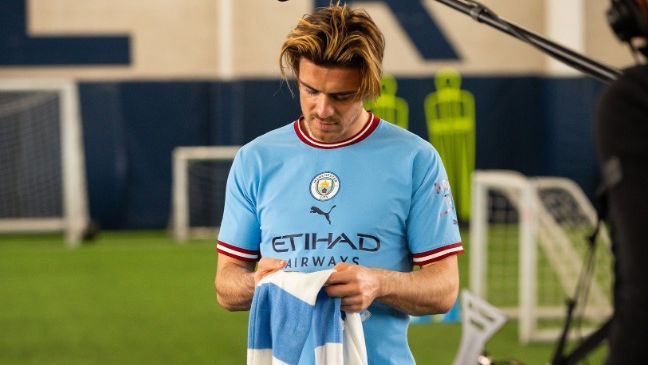City Football Group’s pulse-measuring ‘smart scarf’ takes fandom into future

Gab Marcotti defends Erling Haaland’s performance for Manchester City in their 3-1 Community Shield loss to Liverpool. (1:19)
Just when you thought the football scarf had reached its final stage of evolution with the high resolution, 22-colour imagery made possible by the introduction of the 12-gauge automatic knitting machine, Manchester City have gone and pushed the humble matchday accessory right into the digital age.
Indeed, City are working on the development of the world’s first “smart scarf” that will, among other state-of-the-art functions, be able to track the wearer’s physiological reactions during games. The project is a collaboration between the reigning Premier League champions and Cisco, the enormous global technology conglomerate based in California. Cisco also just so happen to be the current official tech partners of the City Football Group.
“The idea for this project came from looking at the level of performance data that takes place for elite players. So we thought, why wouldn’t we do the equivalent for the fans who fuel the sport?” says Chintan Patel, Chief Technology Officer at Cisco for UK and Ireland.
To the untrained eye, the “Connected Scarf” appears to be a regular football scarf. However, the striped woven garment comes embedded with a biosensor that monitors fans’ vitals during any given passage of play.
Those different data points will tell us how different fans are feeling at different moments, from anger and relief, to joy and disappointment. “Someone scoring a goal might be the highlight for one fan, but for another person it might be the save the goalkeeper makes or the clash that two players have. So there’s a lot that can potentially come out of this,” says Patel on the nuances within a macro-level approach to this data.
“The scarf helps us study the passion that fans have, and ultimately, what can the fans get from it in terms of their own behavior? We’re really keen to look at what those impactful moments will be and demonstrate to fans their connection with the club.”
Every inch-perfect Kevin De Bruyne through-ball, and every ruthless Erling Haaland finish — all of it will be logged in biometric form and reduced to numeric spikes and industry-leading sweat telemetry.
According to Reuters, the smart scarf is still at the pilot stage of its development and is unlikely to be commercially available to Man City fans until next season (2023-24) at the earliest. Before then, the team intend to distribute a small number among select fans of Man City and MLS franchise New York City FC, who are also part of the City Football Group, in order to undergo a series of live test events.
The idea of the scarf, at least as far as the accompanying press release is concerned, is to form an even closer unity between a football club and their fans — presumably by collecting and collating their biometric data.
Quite what the club intend to do with all the bio-info after the game is unknown, though the data will be anonymised without looking at specific individuals, according to Cisco.
As to whether or not the smart scarf itself would be able to stand up to a full wash cycle at 30 degrees after being steadily infused with the wearer’s neck sweat for several home matches in a row, the scarf can be washed but the micro board and the inside weights (which ensure the sensor conducts the skin effectively) would be removed and reapplied once the scarf is cleaned and dried.
Two simple but entirely legitimate queries in their own right — both of which we might suspect will need further answers when the scarf is released to the general public.
“Over the next couple of years we’ll see tens of billions of more things connected to the internet, and our question is, why not the scarf?” says Patel.